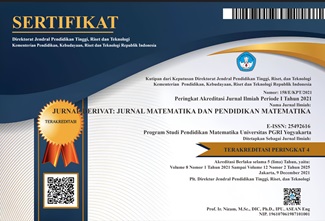Eksplorasi Etnomatematika Pada Alat Musik Pantun Bambu Cilegon
DOI:
https://doi.org/10.31316/jderivat.v9i2.4208Abstract
Ethnomathematics is an activity carried out by cultural groups without realizing that there are basic mathematical concepts in their application. Ethnomathematics as a study of mathematics with cultural nuances will contribute to the field of education. This study aims to explore the mathematical concept of the musical instrument Pantun Bambu Cilegon City. This study uses descriptive qualitative research with ethnographic method. This research was conducted at Sanggar Singpring, Link. Temugiring, Kel.Banjarnegara, Kec.Ciwandan, Cilegon City, Banten. The subjects in this study were Mr. Afandi, Mr. Iing, and Mr. Imadudin. Data were collected by conducting interviews, observation, and documentation. Data analysis uses data collection, data reduction, data presentation, and conclusions. The results showed that there are mathematical concepts in Pantun Bambu, namely plane geometry, solid geometry, and arithmetic sequences. The results of this study are expected to help in the field of education, especially mathematics in understanding mathematical concepts because it is associated with the cultural life around it.
Keywords: Exploration, Ethnomathematics, Pantun Bambu
References
Amalia, A. (2021). Eksplorasi Etnomatematika Batik Krakatoa Cilegon Sebagai Sumber Belajar SMP. Wilangan: Jurnal Inovasi dan Riset Pendidikan Matematika, 2(1), 36-43.
D’Ambrosio, U. (1985). Ethnomathematics and Its Place in the History and Pedagogy of Mathematics. For the Learning of Mathematics, 5(1), 44-48. doi:10.2307/40247876
Fajriyah, E. (2018). Peran Etnomatematika Terkait Konsep Matematika dalam Mendukung Literasi. Prisma : Prosiding Seminar Nasional Matematika, 114-119.
Firdaus, B. A., Widodo, S. A., Taufiq, I., & Irfan, M. (2020). Studi Etnomatematika: Aktivitas Petani Padi Dusun Panggang. Jurnal Derivat, 7(2), 85-92. doi:https://doi.org/10.31316/j.derivat.v7i2.983
Fredy, Halimah, L., & Hidayah, Y. (2020). Malind-Papua Ethnomathematics: Kandara Musical Instrument as Learning Media for Geometry Concepts in Elementary School. Jurnal Iqra' : Kajian Ilmu Pendidikan, 5(1), 43-57. doi:10.25217/ji.v5i1.872
Lubis, S. I., Mujib, A., & Siregar, H. (2018). Eksplorasi Etnomatematika pada Alat Musik Gordang Sambilan. Edumatika Jurnal Riset Pendidikan Matematika, 1(2), 1-10. doi:https://doi.org/10.32939/ejrpm.v1i2.246
Ningsih, N., Hariyani, S., & Fayeldi, T. (2019). Analisis Kesalahan Siswa dalam Menyelesaikan Soal Lingkaran Berdasarkan Kategori Watson. UNION: Jurnal Pendidikan Matematika, 7(2), 187-200. doi:10.30738/union.v7i2.3715
Nisa, F. F., Nurjamil, D., Muhtadi, D., & Sukirwan. (2019). Studi etnomatematika pada aktivitas urang sunda dalam menentukan pernikahan, pertanian dan mencari benda hilang. Jurnal Penelitian Pendidikan dan Pengajaran Matematika, 5(2), 63-74. doi:https://doi.org/10.37058/jp3m.v5i2.919
Pathuddin, H., & Raehana, S. (2019). Etnomatematika: Makanan Tradisional Bugis Sebagai Sumber Belajar Matematika. Jurnal Matematika dan Pembelajaran, 7(2), 308-310. doi:10.24252/mapan.2019v7n2a10
Putri, L. I. (2017). Eksplorasi Etnomatematika Kesenian Rebana Sebagai Sumber Belajar Matematika Pada Jenjang Mi. Jurnal Ilmiah Pendidikan Dasar, 4(1), 21-31. doi:http://dx.doi.org/10.30659/pendas.4.1.%25p
Sugiyono. (2013). Metode Penelitian Kuantitatif Kualitatif dan R&D (19 ed.). Bandung: Alfabeta.
Ulum, A. S. (2013). Study Ethnomathematics: Pengungkapan Karakteristik Kultural Matematika Pada Aktivitas Bertenun Masyarakat Adat Baduy. Thesis, Universitas Pendidikan Indonesia.
Downloads
Published
Issue
Section
Citation Check
License
Copyright (c) 2022 Deslianti Uliarta Pasaribu, Sukirwan

This work is licensed under a Creative Commons Attribution-ShareAlike 4.0 International License.
Authors who publish with this journal agree to the following terms:
-
Authors retain copyright and grant the journal right of first publication with the work simultaneously licensed under a Creative Commons Attribution-ShareAlike 4.0 International License that allows others to share the work with an acknowledgment of the work's authorship and initial publication in this journal.
- Authors are able to enter into separate, additional contractual arrangements for the non-exclusive distribution of the journal's published version of the work (e.g., post it to an institutional repository or publish it in a book), with an acknowledgment of its initial publication in this journal.
- Authors are permitted and encouraged to post their work online (e.g., in institutional repositories or on their website) prior to and during the submission process, as it can lead to productive exchanges, as well as earlier and greater citation of published work (See The Effect of Open Access).







